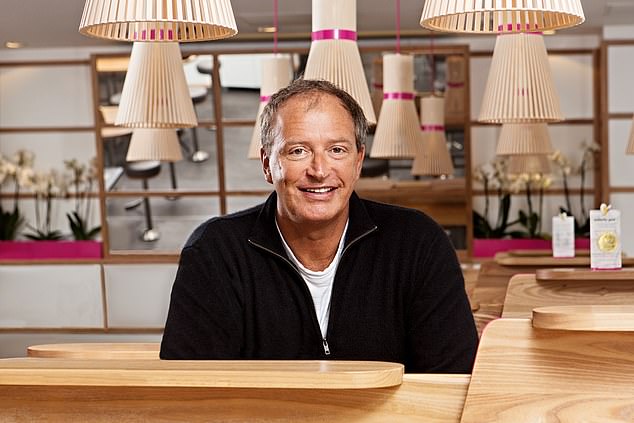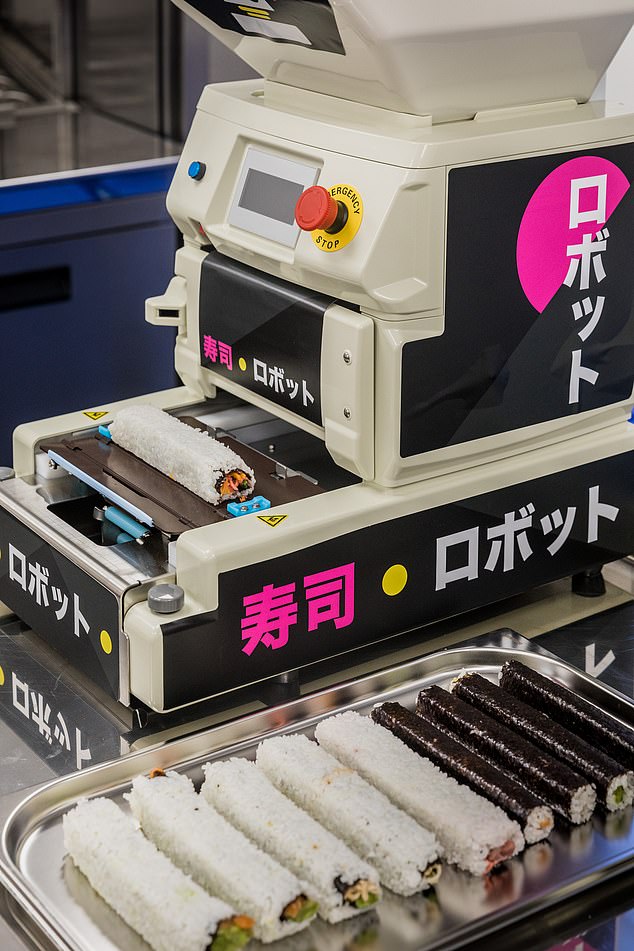Mr Sushi serves up a fast food revolution at Itsu: Cheaper food, touch-screen menus and kitchen robots
There is no pause as Itsu founder Julian Metcalfe answers how his sushi empire is faring in the wake of the pandemic: ‘It’s been completely decimated.’
The East Asian-inspired fast food chain is almost completely reliant on the lunchtime trade and well-heeled office workers paying up to £10 for a box of sushi.
Some 35 of its 77 stores are still shut. A third of its staff are on furlough. Last month it completed an insolvency procedure, known as a company voluntary agreement, to close two stores and slash rents on 53 more. Some might think it will be a long way back.

Struggle: Itsu boss Julian Metcalfe believes the threat of Covid-19 ‘has been blown out of all proportion’
It’s ‘extraordinary that businesses aren’t bringing people back’ to the office, Metcalfe, 60, complains.
The risk of the virus ‘has been blown out of all proportion’ and ‘we live in a world where our leaders don’t like delivering bad news, they just can’t bear it’.
He says: ‘How many knee-jerk reactions will we see? Next week you won’t be able to eat rabbit, it’s ridiculous.’
But with newly lowered rents, he believes his stores will survive until office workers make their slow return.
His re-invigorated expansion plan has been hatched with ‘Elon Musk-type stealth’ in lockdown.
Office workers are Itsu’s history, he says, ‘its future will be different’.
Metcalfe says his crusade with Itsu, which he founded in 1997, is to offer a healthy lunch for £7.
His style is more mad inventor than fastidious accountant, but compared to some of the technocrats who run top companies, it’s refreshing.
‘I’ll put in whatever it takes’, he says, adding that total investment has hit ‘£40million to £50million’ in the last three years. ‘And we’ll put in more – this is a really long game.’
His wealth was estimated to be £215million last year. Itsu’s latest accounts show sales rose 10.4 per cent to £116.5million in 2018, while losses narrowed from £8.8million to £6million.


Deserted: Some 35 of Itsu’s 77 stores are still shut. A third of its staff are on furlough. Last month it completed an insolvency procedure, known as a company voluntary agreement
Today he wants to show off the new restaurant design that is being trialled on Great Portland Street in London’s West End. He says it will be enough to overcome the slump facing the hospitality industry.
‘This is really huge, it’s the first time we’ve cracked affordable fast food,’ he says. Perhaps we should believe him. He did, after all, make his riches reinventing how we eat lunch.
W ITH university friend Sinclair Beecham, he started selling freshly made sandwiches in Hampstead, north London in 1986. When the queue became too long, they made them in the morning and stored them in fridges – Pret a Manger was born.
He sold most of his stake to private equity firm Bridgepoint for £364million in 2008. The sale opened up the trappings of wealth to him.
He lives with his wife, art expert and businesswoman Brooke, in a 17th-century Tudor home in Oxfordshire. It is ‘large enough to accommodate their seven children’, notes one interior magazine writer.
The interest is reminiscent of Metcalfe’s former life in the society pages (his grandfather Edward was best man at Edward VIII and Wallis Simpson’s wedding).
Now even Pret, worth £1.5billion when JAB Holding bought it in 2018, is on its knees. It has axed 2,890 staff and will shut 30 outlets.
Its boss, who racked up huge profits from its ‘follow the skyscraper’ strategy, admitted last week it was too focused on London.
Metcalfe is reluctant to talk about Pret but thinks it is ‘probably very concerned’, noting it doesn’t bring in punters much after 3pm.
By contrast, Itsu has not cut staff. In fact, there’s talk of breaking outside London in a meaningful way for the first time. And there are encouraging signs.
The new-style restaurant on Great Portland Street has been open a week. ‘Everyone’s been pretty pleased. We try not to put targets for the first month, it’s a waste of time – or if there was a target, they didn’t tell me,’ says Metcalfe.
The hope is to bring couples and groups of friends in for a quick bite in the evening and vie with the leading Asian chain, Wagamama. Little expense has been spared on the restaurant – down to the real orchids.
‘It’s top-class Itsu stuff. It would not look out of place in Kyoto,’ Metcalfe boasts. ‘There hasn’t been much development in affordable healthy fast food because it’s just so difficult.


One of Itsu’s ‘sushi robots’ churns out the Nigri. The machines can produce 4,800 perfectly shaped rice snacks per hour
We’re still having to rely on Wagamama, Nando’s, and a few other places. If your budget is £7, you have a problem.’
He excitedly runs through innovations in this restaurant that he hopes to roll out across the estate. Touch screens planned ahead of Covid, but now with the added benefit of removing ‘endless interaction by hand’.
He has slimmed down Itsu’s menu to 16 hot and 16 cold items – downgrading the importance of sushi. At the same time he has cut prices so that sushi boxes are £3.99 to £8.39, and rice and noodle bowls are £5.50 to £6.50.
The hot recipes – which include best-seller teriyaki chicken, spicy Korean chicken and vegetable gyoza noodles – taste good.
The price is kept down by bulking out the bowl with carbs, with clever presentation to give a wow-factor. Seven in ten dishes are under 500 calories and nothing is fried.
Another eye-catching element is a new generation of sushi robots, which shape the sushi rice all without being handled by chefs.
‘I don’t know how much they cost, £50,000 or something,’ Metcalfe says, but is later corrected by a minion (they are a mere £12,000).
The nigiri robot produces 4,800 perfectly shaped rice snacks per hour – almost too quickly for the chef to harvest. The machines – more common in Japan where they are made – free up staff for other parts of the store.
If Metcalfe’s reinvention comes off, then expect to see stores in a town near you – he anticipates the next stage could get up to 170 in the UK.
‘It’s far more than a business, it’s an absolute crusade,’ he finishes dramatically. ‘Not since the 50s has fast food caught up with changing tastes and nutrition needs. It’s a start. We will lead and many will follow.’
